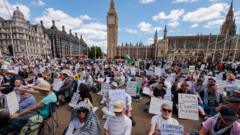
‘Things are getting better right? I mean for people like you?’
‘By people like me,’ I reply. ‘Do you mean Disabled people?’
This is a conversation I feel like I, a physically Disabled woman, am constantly having with my pre-disabled peers.
It’s almost as though I am asked to reassure them that my life is OK and that they shouldn’t feel guilty.
I mean it is 2025 after all and ‘people like me’ are, in many ways, assimilated into mainstream society.
Perhaps you’ve noticed a co-worker has a limb difference, or your favourite television show proudly showcases cast members from the Disability community.
Maybe, there are Deaf, Disabled or Neurodivergent classmates at your kid’s school.
So, things must be better simply because you can see us now more than ever? Yet being more visible after decades of being hidden away by society does not qualify as a better existence or quality of life.
I want those people who assume my life is better for being more visible to know that they are seeing the world through an enabled gaze.
The truth is that Disabled people face discrimination daily.

New research by MoreinCommon has found that 78% of Disabled Britons feel life is harder for Disabled people than non-Disabled people. Over half (51%) think that life in the UK has become harder for us over the past 10 years.
I want non-Disabled people to think hard about our struggle, but also to think about us positively.
This is why it’s so important to celebrate the Disability community in all its multifaceted and vibrant colour, and the Scope Awards aims to do this.
The Scope Awards is a celebration of Deaf, Disabled and Neurodivergent people and a way to ultimately amplify our voices.

This annual ceremony celebrates those within our society: Disabled people and our allies who place value and pride in our community.
And there is a lesson in that for everyone who isn’t Disabled. You may know us, but until you listen to us, champion us and give us tangible change and opportunity you are simply objectifying us to feel better about yourself.
You shouldn’t kid yourself about the reality of discrimination.
It takes many forms – like in the workplace, with Disabled people twice as likely to be unemployed.
Scope Awards 2025

Metro is also the official media partner of 2025 Scope Awards that will take place next month.
The ceremony will celebrate the work disabled people and organisations are doing to bring about important change.
Hosted by the BAFTA-nominated actor Adam Pearson, unsung heroes, amazing achievements and the incredible accolades of the disabled community are all being honoured at the Kia Oval.

There are 38 nominees for the nine Scope Awards: Accessible Product, Celebrity Role Model, Community Group, Inclusive Workplace, Journalist, Marketing Campaign, Media Moment, Purple Pioneer and Social Media Influencer.
Life also costs significantly more for us. In fact, the average extra cost of being Disabled is estimated at £1,067 according to Scope. Every single month.
And from governments to people in the street, disabled people are constantly vilified.
All of my Disabled or Neurodivergent friends have faced online trolling aimed solely at attacking their differences.
That crosses over into real life too.
Just last week I had an altercation with a taxi driver who attempted to pick me up in a cab without a working ramp.
When I told him I’d have to cancel, he became verbally aggressive and screamed: ‘It’s people like you who are so difficult – if I’d known you used a wheelchair I wouldn’t have picked you up.’

Ignorance like this still prevails and it is largely because people don’t allow us to speak our truths.
We still very much live in a world whereby able and enabled privilege prevails and ableism is so ingrained within our culture that most if not all Disabled people, myself included, live a lesser life.
For me, the new findings about Disabled people’s real-life experiences highlight this. The more visible we are, the more the world has to see the inequalities we face.
We aren’t hidden away in institutions anymore or kept segregated within our communities. Now, we have a voice and we will scream from the rooftops about ableism.
However, people outside the Disabled community often don’t like to be told where they are failing, and don’t want to hear about our pain. Exposing our truth means others should be called to action, and action costs money and takes time and owning up to past wrongs.

This is why I feel as though it’s tougher now to be Disabled. We are more malleable when we say nothing.
But, here’s a reality check: those times are long gone and the Scope awards showcases those within our community who won’t be silenced.
One in six people are Disabled. Think about this in context to your own family, friends, neighbours and colleagues: we will all have to live and work together to make this world more Disability friendly.
And if you struggle to empathise naturally with Disabled people, ask yourself this: Would you want to live in a world that tells you repeatedly that you are lesser than others?
Would you want your own children to miss out on accessing higher education, or accomplishing a milestone like moving into their own home or securing their first job?
Would you want to live in fear that your independence is going to be ripped away from you every time a brown envelope lands on your doorstep and you may not be able to feed yourself or leave your home?
Because all of this is a reality for Deaf, Disabled and Neurodivergent people like me.
My life isn’t a tragedy because I was born with a rare condition, but it’s tragic that in 2025 we still do not place value on the lives of Disabled people.
Do you have a story you’d like to share? Get in touch by emailing [email protected].
Share your views in the comments below.







.jpg.webp?itok=1zl_MpKg)





 Bengali (Bangladesh) ·
Bengali (Bangladesh) ·  English (United States) ·
English (United States) ·